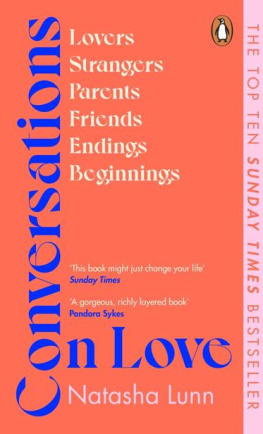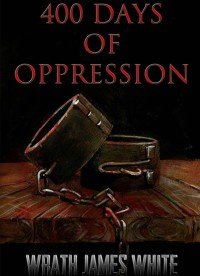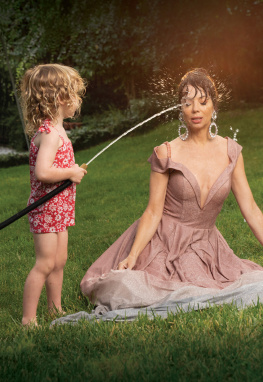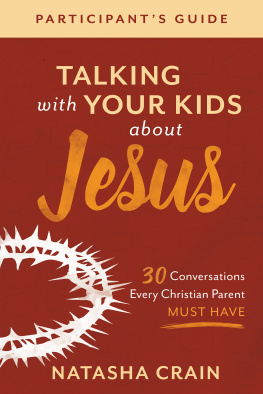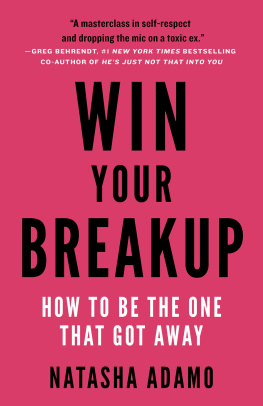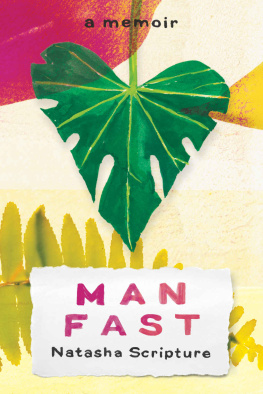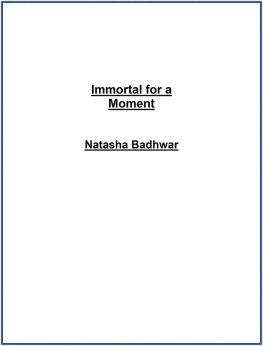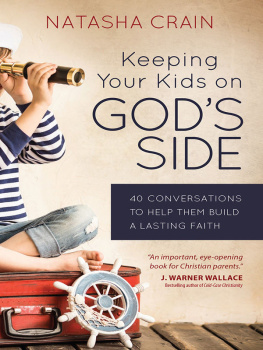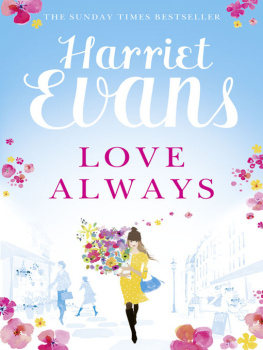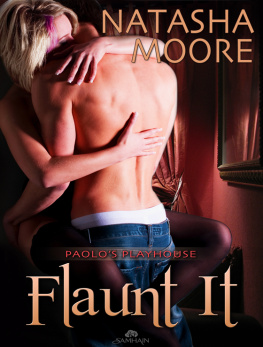Natasha Lunn - Conversations on Love
Here you can read online Natasha Lunn - Conversations on Love full text of the book (entire story) in english for free. Download pdf and epub, get meaning, cover and reviews about this ebook. year: 2021, publisher: Penguin Books Ltd, genre: Religion. Description of the work, (preface) as well as reviews are available. Best literature library LitArk.com created for fans of good reading and offers a wide selection of genres:
Romance novel
Science fiction
Adventure
Detective
Science
History
Home and family
Prose
Art
Politics
Computer
Non-fiction
Religion
Business
Children
Humor
Choose a favorite category and find really read worthwhile books. Enjoy immersion in the world of imagination, feel the emotions of the characters or learn something new for yourself, make an fascinating discovery.
- Book:Conversations on Love
- Author:
- Publisher:Penguin Books Ltd
- Genre:
- Year:2021
- Rating:3 / 5
- Favourites:Add to favourites
- Your mark:
- 60
- 1
- 2
- 3
- 4
- 5
Conversations on Love: summary, description and annotation
We offer to read an annotation, description, summary or preface (depends on what the author of the book "Conversations on Love" wrote himself). If you haven't found the necessary information about the book — write in the comments, we will try to find it.
Conversations on Love — read online for free the complete book (whole text) full work
Below is the text of the book, divided by pages. System saving the place of the last page read, allows you to conveniently read the book "Conversations on Love" online for free, without having to search again every time where you left off. Put a bookmark, and you can go to the page where you finished reading at any time.
Font size:
Interval:
Bookmark:


- Conclusion :
What I Wish Id Known About Love
Natasha Lunn is the features director at Red magazine and the creator of a popular and acclaimed email newsletter, Conversations on Love. She has completed a foundation course on couple counselling and psychotherapy at the Tavistock Centre. She lives in London.
For anyone who feels lost in longing
The stories we sit up late to hear are love stories. It seems that we cannot know enough about this riddle of our lives. We go back and back to the same scenes, the same words, trying to scrape out the meaning. Nothing could be more familiar than love. Nothing else eludes us so completely.
(Jeanette Winterson, The PowerBook )
For years, I was committed to longing. Longing for a reply to a text message, for an I love you, or for a man to look at me a certain way. If I was in a relationship, I longed for it to last, and if I wasnt, I longed to find one. My longing was a restlessness that spread out into my life like a mist. I could not see anything clearly with it there.
I used to think it was love that I was longing for, but I was wrong. I was obsessed with the idea of love, not the truth of it. All those years and nights I spent asking, When will I find love? I never paused to think about what precisely it was. Do many of us? We dont learn about love at school, we dont research it, or take a test in it, or review it once a year. Were encouraged to learn about economics and grammar and geography, but not to know about love. It seems strange to me, how we expect so much from love, and yet devote so little time to understanding it. Like wanting to dive into the sea but having no interest in learning how to swim.
And yet, whether we think about it or not, love leaks in and out of all of our lives, every day, freely, cruelly and beautifully. I watch a video of my friends six-week-old baby wriggling in the bath one hour before reading a quiet email from a woman whose third round of IVF has just failed. I think about two new engagements, another that was called off, another that never happened. I listen to the friend trying to build a new life after an unexpected divorce, the friend who is grieving a parent, the giggly optimism of another friend tentatively unwrapping a brand-new love. On and on it wilts and blooms, the love in all of our lives. Unknowable and undefinable. Or so I thought.
For a long time, I assumed love was the source of my unhappiness. I wanted to understand why it felt beyond my capabilities. Why could I walk away from a job I was unhappy with, but not from a bad relationship? Why did I have agency in every other aspect of my life, and not in love? Why did I assume marriage would be the end of something, and not the beginning? My suspicion that I had misunderstood love completely was what Elizabeth Gilbert once described as a breadcrumb of curiosity, a clue that I needed to pick up and follow.
Thats why, for the last four years, Ive asked writers and therapists and experts about their experiences of love in an email newsletter called Conversations on Love. Ive listened to people talk about their love for a person, for a city, for a poem, for a tree. Ive listened to a man say he wished hed slept with more people and a woman say that sex is the dream life of a marriage. Ive listened to people share stories about sustaining a 26-year-long friendship across different countries, about falling in love while losing a child or grieving a sibling, about seeing babies born in war zones and about learning to find romance in solitude. Each one was a reminder that love was possible, and that my understanding of it had been limited.
While I was having these conversations, love was leaking in and out of my life too. The interviews expanded my idea of what love could be, and what it could look like, but it wasnt until I started trying to conceive after a miscarriage that I began to see how much more I had to learn. Because although I thought Id outgrown my propensity towards longing, there were many similarities between my longing for a baby in my thirties and my longing for a boyfriend the decade before. Both made me more focused on the love I didnt have rather than the love I did. Both sometimes tipped me towards self-pity. Both made me compare myself to others and feel like there was an area of happiness in life I was excluded from. I used to look longingly at couples holding hands on Sundays, but now I fixated on women pushing buggies round the local park. The thing I was longing for had changed, but the restless, searching feelings were the same. I understood then there would always be something to long for in love if I continued to see it in this narrow way a boyfriend, a marriage, a baby, a second baby, a grandchild, another decade on this Earth with my mother, father or husband. So I began to ask more questions. I began to write this book.
Every day, you will be asking your own questions about love too. Maybe you are looking for a relationship or, in a secret place in your heart, asking whether you should leave one. Maybe you are in a long-term partnership, wondering how to sustain love through lifes many storms. Maybe you are a parent and you want to be a better one; or youve lost a parent, and that loss suddenly seems to dwarf everything else. On the surface what we want and need from love are different. But I have found that our individual questions are often rooted in three bigger ones: How do we find love? How do we sustain it? And how do we survive when we lose it? These are the questions I want to explore in the pages ahead.
Its no exaggeration to say the conversations about love Ive had have changed my life. They helped me to see through the mist of longing, to see the love that was already in my life, all along. Theyve also convinced me that, although love is in many ways unknowable, it is useful for us to try to define it. As bell hooks wrote in All About Love, Learning faulty definitions of love when we are quite young makes it difficult to be loving as we grow older and a good definition marks our starting point and lets us know where we want to end up.
And we do need to start learning more about love, I think, just as we would any other skill, because it can determine the course of a life. As Dr Julianne Holt-Lunstad found in her study on the link between social connection and lifespan, people with strong social relationships are 50 per cent less likely to die prematurely than people with weak social relationships. Despite the lack of attention it gets contrast the number of pages a newspaper devotes to politics or finance or travel compared to relationships there are few things more serious, more important than love. A lack of it can cause so much damage. A wealth of it can heal us.
Although the conversations in this book are stories about love, they are also about the way humans are drawn together and disappointed by each other, how they hurt and mend, how they keep moving forward, even when they think they cant, trying to grasp some meaning from what life takes away from them. My hope is that they can be for you what they have been for me: a reminder to not let the people you love slip into the background; an invitation to take love more seriously; and an encouragement to make something meaningful out of the life you have been given.
Next pageFont size:
Interval:
Bookmark:
Similar books «Conversations on Love»
Look at similar books to Conversations on Love. We have selected literature similar in name and meaning in the hope of providing readers with more options to find new, interesting, not yet read works.
Discussion, reviews of the book Conversations on Love and just readers' own opinions. Leave your comments, write what you think about the work, its meaning or the main characters. Specify what exactly you liked and what you didn't like, and why you think so.

